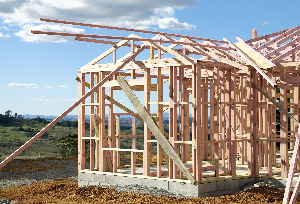
by Sally Lindsay

Master Builders Association national vice-president Johnny Calley says more companies will go under due to the sharp increase in the price of materials.
The construction industry is in a precarious position. More than 18% of company failures in the past year were building companies going under mainly because of labour and material shortages and increasing costs.
Since the start of this year, 92 construction companies have been put in liquidation. It comes as the Reserve Bank Governor Adrian Orr says construction and housing costs are the greatest domestic threat to inflation and the economy and new figures show the cost of building a new home is increasing at its fastest rate on record.
Building and construction is a significant contributor to the national economy so its performance matters. It’s currently the third largest contributor to GDP, some $20 billion per annum and sustaining over 540,000 jobs.
With 95% of building firms employing 10 staff or less, our workforce is deeply embedded in their communities right across our cities and regions. They are responsible for building homes, schools, and hospitals.
Index up 7.7%
Property research firm Core Logic's latest Cordell Construction Cost Index (CCCI), which measures the cost of building a "standard" 200m2 three-bedroom, two bathroom, single storey brick and tile house, rose by a record 2.6% in the three months ended June, lifting annual growth to 7.7%.
"This is the swiftest rise in the NZ CCCI in a decade, and I don't expect these price pressures to ease for at least another couple of quarters, given ongoing materials shortages and labour pressures, says Kelvin Davidson, CoreLogic’s chief property economist.
“It wouldn’t be a surprise if cost pressures get worse in the next quarter or two, potentially pushing up towards double-digit indexed growth, before they start to slow later as builders’ workloads potentially ease off next year.
This indexed model of construction costs allowed for standard build times, says Davidson, acknowledging completion timeframes had lengthened lately as some materials remain hard to get.
CoreLogic construction cost estimation manager, John Bennett says rapid recent cost growth has impacted a range of different trade categories and components in residential construction. “It really is a perfect storm.”
He says metal prices continue to be affected with further rises to reinforcing, fixings and fittings. The cost of metal also has an impact on fencing and garage doors, as well as the aluminium window industry, with substantial increases for those products, too.
“The effect of higher timber costs also continues to flow through the market. We are seeing knock-on effects into different industries, such as landscaping supplies and kitchen cabinetry. Imported products, particularly metal based items and tiles are rising, as well as cost hikes from consultancies, affecting preliminary costs,” Bennett says.
Smaller houses
“Other pressures are at play in the industry, with labour availability and overheads impacting costs. Labour availability can also affect build times, and can leave builders more exposed to market changes and holding costs.”
New building consents have been driven by smaller dwellings such as townhouses which now equate to more than half (51%) of all new consents nationally – a record high. In Auckland, that proportion has surged above 70%.
Davidson says while smaller dwellings may require fewer materials, the volume in the pipeline indicates there will likely be no respite for the stretched materials supply chain – nor for labour capacity.
But we’d also be a bit more confident than in the past that the wider construction industry won’t go from boom to bust,” he said.
Policies need changing
The Master Builders Association says the pressures on the building and construction sector continue to mount and now is the time to act and do things differently.
“After each boom and bust cycle we somehow expect it to be different the next time, but the cycle keeps on repeating because, as a country, we haven’t learnt from our past mistakes. While lessons from the past can seem straightforward, they have proved elusive to achieve.”
Since the 1970s, perverse disincentives for council planning and consenting processes have grown. Ad-hoc, incremental government policy changes since then treat symptoms rather than cause, and acute infrastructure financing limits for councils has seen public policy largely driving the dysfunction of the housing market.
The association says this reinforces the crucial role of government. “It is, after all, a significant player in the commercial construction market, building hospitals, schools, libraries, social housing, and other public amenities. Both government and the sector have roles to play
“With greater predictability and less volatility over time, central and local government and developers would be able to better plan what type of houses to build and where.
Taking a strategic view, by viewing housing as critical infrastructure, would constitute transformative public policy and would help an already stressed sector through the looming cyclical downturn,” says the association.
“That is how we will move from reactive, catch-up policy making responding to market inequities, to proactive leadership that can better anticipate the tough challenges faced in the sector.
“We also know that during the last downturn, it took the sector seven years before its workforce recovered to pre-bust numbers. In that time, our housing and infrastructure deficit reached crisis point. The country cannot afford for this to happen yet again.”
| « Answers to climate risk and housing getting closer | Buying opportunities stacking up for Canterbury investors » |
Special Offers
No comments yet
Sign In to add your comment

© Copyright 1997-2026 Tarawera Publishing Ltd. All Rights Reserved